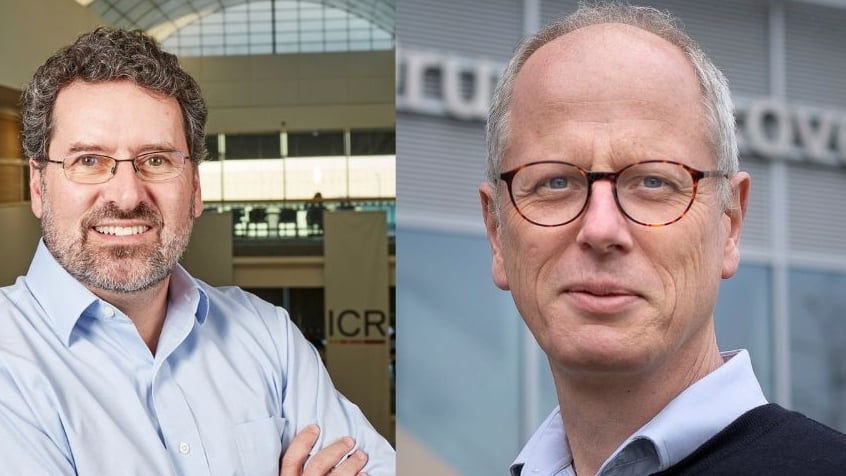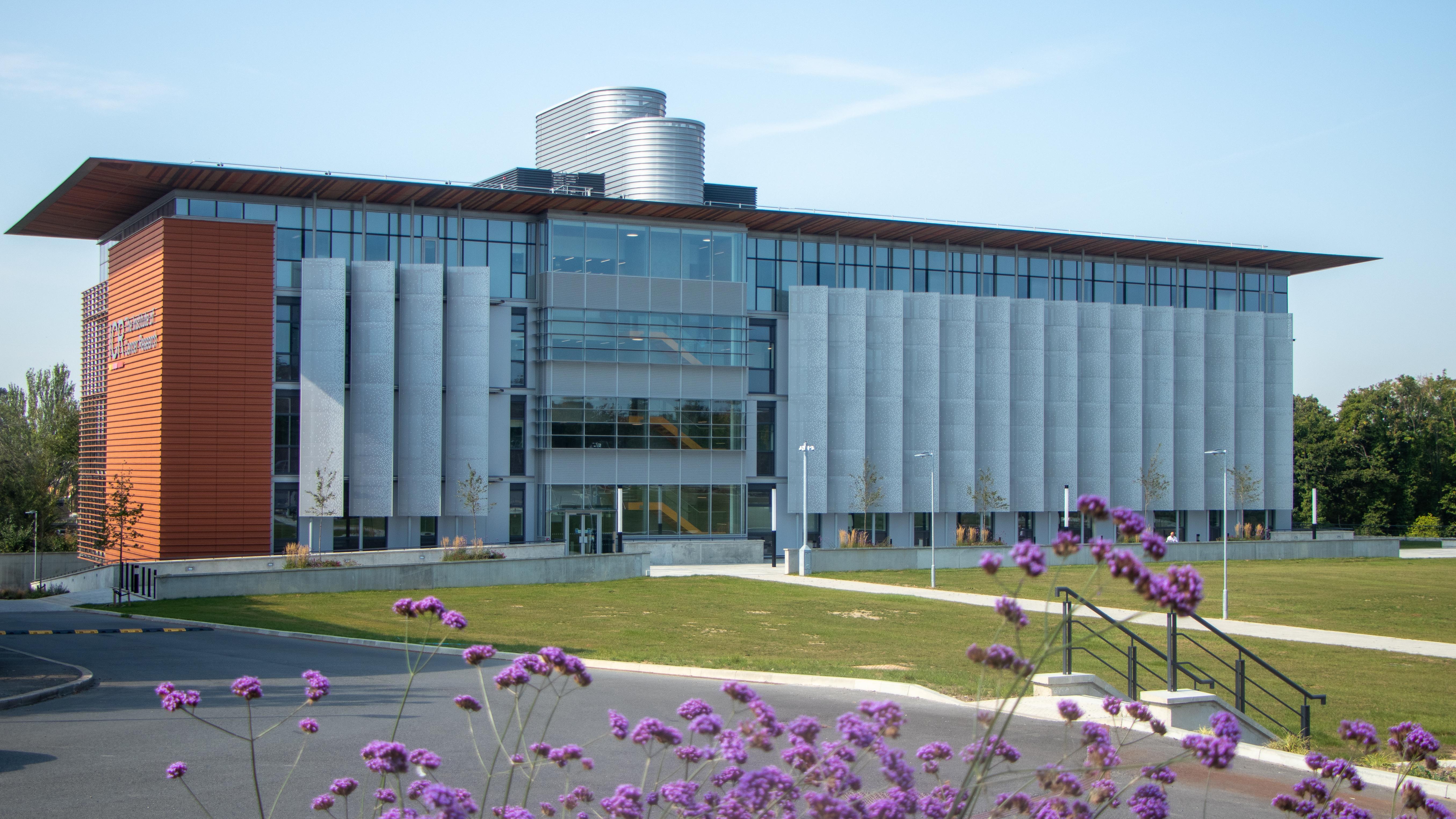
Image: Professor Louis Chesler (left) and Professor Swen Hoelder (right). Credits: John Angerson (left) and Danielle Lane (right).
A global, interdisciplinary team of researchers has been selected to receive a Cancer Grand Challenges award of up to $25m over five years to tackle the challenge of solid tumours in children.
The Cancer Grand Challenges PROTECT team includes Professor Louis Chesler and Professor Swen Hoelder from The Institute of Cancer Research, London, and is led from Hopp Children's Cancer Center Heidelberg (KiTZ) in Germany by Professor Stefan Pfister.
Cancer Grand Challenges is a global funding platform, co-founded by Cancer Research UK and the National Cancer Institute in the US, that supports a community of diverse, global teams to come together, think differently and take on some of cancer’s toughest challenges.
An urgent need for new treatments
Cancer remains a leading cause of death due to disease among children globally, and outcomes for some childhood cancers have not improved in more than 30 years.
Treatments for solid tumours in children still rely on decades-old chemotherapies, and often radiotherapy. There is an urgent need for new, kinder, more targeted treatments for children with cancer. However, individual childhood cancers are rare, so progress requires interdisciplinary work from across the world.
Team PROTECT will take on this challenge. The team will use protein degradation strategies to target previously undruggable drivers of children’s cancers. Drugs that may emerge from these programmes could revolutionise the field and transform the lives of children with cancer.
The Institute of Cancer Research (ICR) is one of the world’s leading institutions for the discovery of new cancer drugs. Researchers at the ICR are pioneering protein degradation, which involves breaking down cancer proteins rather than switching off their function, as a targeted technique to treat cancer. In the 2022, the ICR announced the launch of a dedicated Centre for Protein Degradation within the ICR’s Centre for Drug Discovery.
Professor Swen Hoelder, Professor of Medicinal Chemistry and Drug Design and Head of Chemistry within the Centre for Cancer Drug Discovery at The Institute of Cancer Research, London, said:
“Many children are diagnosed with aggressive cancers that are difficult, and sometimes impossible to treat, with terrible consequences for the patients and their families. Drug discovery requires collaboration of outstanding research teams with different expertise, but the small number of patients with childhood cancer means that unfortunately this is not commercially attractive, making it very difficult to secure sufficient funding for the research. So, the Cancer Grand Challenge will address this critical gap and help us to discover new, kinder, treatments for childhood cancer.
“I am convinced that this is the right team, and the right time to take a great leap forward, and I can’t wait to see the first new drug reach children in the clinic.”
The ICR is internationally leading in the study of cancers in children, teenagers and adults. Our researchers are transforming the way these devastating illnesses are diagnosed and treated – building international partnerships like Team PROTECT has been key to that progress.
Team PROTECT will ‘have a monumental impact’
Professor Louis Chesler also leads a research programme which aims to develop advanced genetic tests for children’s cancers, that will allow doctors to tailor treatments to the individual patient. Diagnostic cancer tests from the first programme, Stratified Medicine Paediatrics 1, have already been implemented by NHS England for Standard of Care clinical use.
Professor Louis Chesler, Professor of Paediatric Cancer Biology at The Institute of Cancer Research, London, and Consultant in Paediatric Oncology at The Royal Marsden NHS Foundation Trust, said:
“I’m incredibly honoured and inspired to be joining researchers worldwide who will focus all of their power and expertise on the problem of discovering new cancer drugs that are made specifically for children.
“We need innovative new treatment approaches for children with cancer that are effective and have very few side effects. Joining these international teams will have a monumental impact on paediatric tumour research.”
Team PROTECT unites clinicians, advocates and scientists with expertise in paediatric oncology, targeted protein degradation, high-throughput chemical screening, medicinal chemistry, structural biology, tumour biology, preclinical drug testing and clinical trials, across 10 institutions and five countries.
Uniting ‘the world’s brightest minds’
The team is funded by Cancer Research UK, the National Cancer Institute, the Scientific Foundation of the Spanish Association Against Cancer and KiKa (Children Cancer Free Foundation) through Cancer Grand Challenges. It is one of five new teams, representing a total investment of $125m to tackle some of the toughest challenges in cancer research.
Dr David Scott, Director of Cancer Grand Challenges, said:
“Together with our network of visionary partners and research leaders, Cancer Grand Challenges unites the world's brightest minds across boundaries and disciplines and aims to overcome cancer’s toughest problems.
“With this investment, our largest to date, we continue to grow our global research community, and fund new teams that have the potential to surface discoveries that could positively impact cancer outcomes.”
Co-founded in 2020 by two of the largest funders of cancer research in the world: Cancer Research UK and the National Cancer Institute, Cancer Grand Challenges supports a global community of diverse, world-class research teams to come together, think differently and take on some of cancer’s toughest challenges.
These are the obstacles that continue to impede progress and no one scientist, institution or country will be able to solve them alone. With awards of up to $25M, Cancer Grand Challenges teams are empowered to rise above the traditional boundaries of geography and discipline to make the progress against cancer we urgently need.
Cancer Grand Challenges now brings together 1,200 researchers and 16 teams from across the world to take on 13 challenges.
